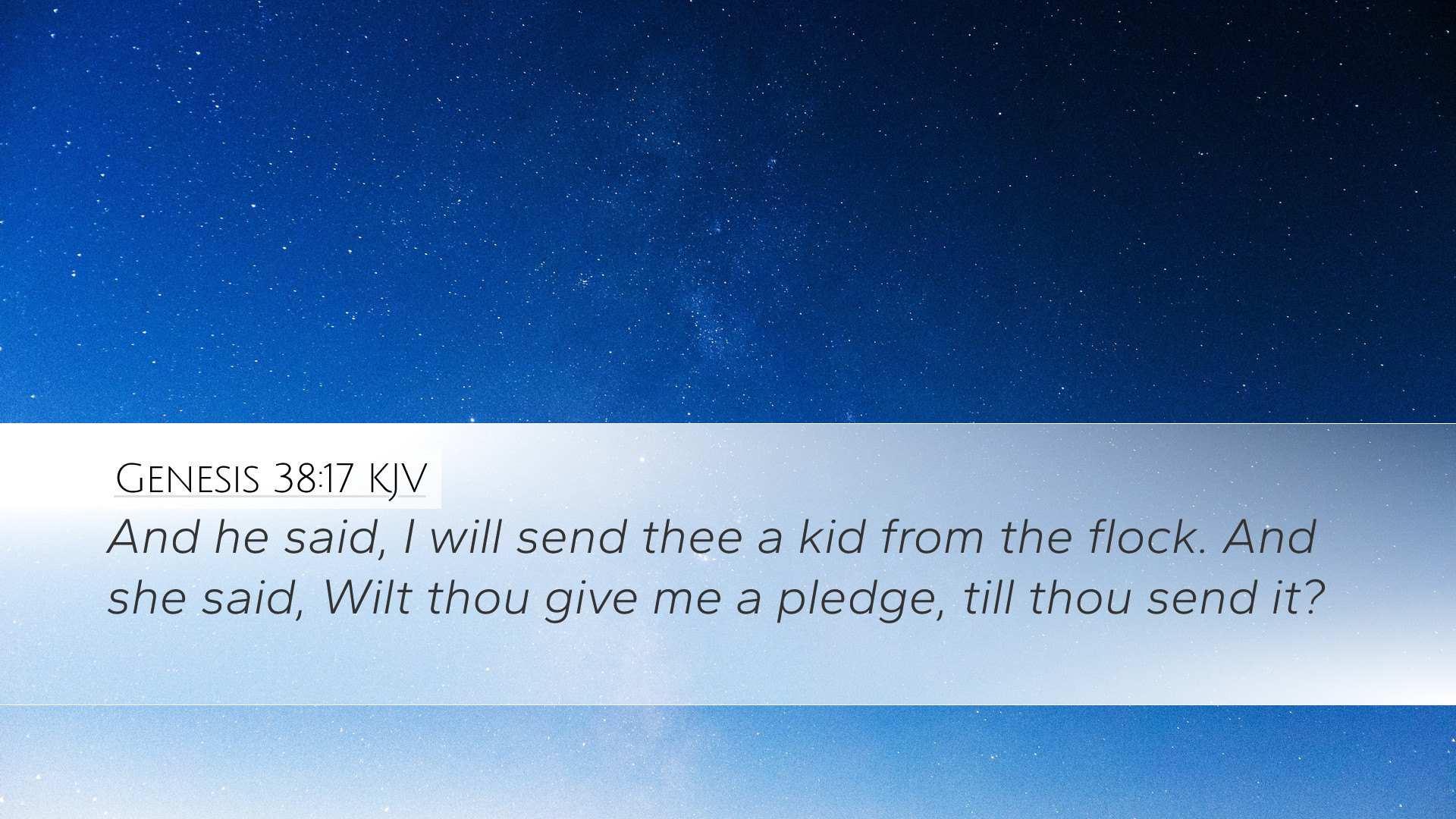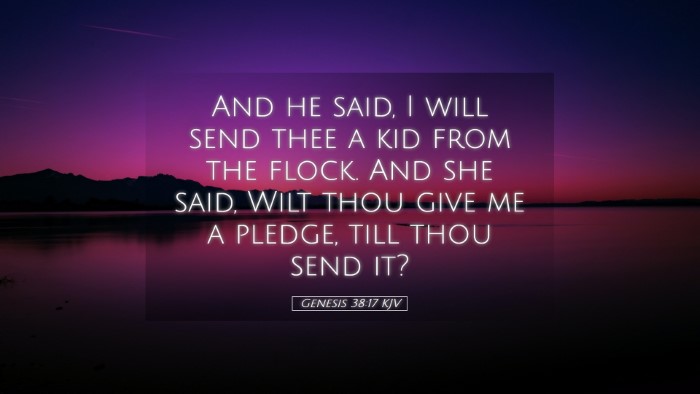Genesis 38:17 Commentary
Genesis 38:17 reads: “And he said, I will send thee a kid from the flock. And she said, Wilt thou give me a pledge, till thou send it?” This verse occurs within the context of Judah’s moral failure and the narrative concerning Tamar, his daughter-in-law. This incident is rich for theological reflection and moral instruction. Below, we summarize insights from prominent public domain commentaries including those of Matthew Henry, Albert Barnes, and Adam Clarke.
Contextual Overview
The event of Genesis 38 serves as a critical junction in the Abrahamic narrative, illustrating issues of morality, justice, and divine sovereignty. After the death of Judah's wife, he sought consolation, which led him to an immoral relationship with Tamar. This narrative contrasts sharply with Joseph's story (found in chapters 39 and following) and raises questions about God’s providence and the unfolding plan of redemption.
Insights from Matthew Henry
Judah’s Character and Deception
Matthew Henry comments on the tragic moral descent of Judah. He highlights how Judah, who initially appeared strong in faith (as the one who suggested selling Joseph), spiraled into grievous sin. He engages in illicit relations, showing disregard for his family commitments. Henry emphasizes how this act of infidelity reveals a person's heart when they are distanced from God’s commandments.
The Role of Tamar
Henry beautifully articulates Tamar’s position. Despite her desperate circumstances, she displayed cunning and resolve. Knowing her necessity to provide offspring for her deceased husband, she cleverly disguises herself as a harlot. Thus, her request for a pledge becomes a significant part of the moral complexity in this passage, showcasing the lengths to which she would go for justice and preservation of the family line.
Albert Barnes' Commentary
The Kid from the Flock
Albert Barnes notes that Judah's offer to send a kid from the flock is significant as it demonstrates the cultural customs of the time regarding pledges in sexual transactions. It illustrates Judah’s intent to fulfill his obligation; however, it also highlights the seriousness of the transaction. Barnes sees the act through the lens of commerce rather than personal integrity, indicative of Judah’s fallen state.
The Nature of the Pledge
Barnes emphasizes the importance of the pledge that Tamar requests. To understand this request is to delve into the broader implication of trust and accountability in relationships. Tamar’s request is a plea for security and assurance, thereby illustrating a critical principle that in any covenant—the promise must be upheld, especially in matters of significant relational consequence.
Adam Clarke's Analysis
Historical and Cultural Context
Adam Clarke provides an enriching socio-cultural context regarding this verse. He explains that within the ancient Near Eastern setting, the actions of both Judah and Tamar must be understood through the lens of customs that governed family and inheritance. The Levirate marriage, which permits a man to marry his deceased brother’s widow to ensure progeny, is at play here, showcasing the cultural obligations that governed familial structures.
Theological Reflections
Clarke sheds light on the ultimate plan of God through these seemingly chaotic events. He argues that even through Judah’s sinful actions, God's sovereign purposes unfold—most notably, that the lineage of Christ emerges from this entanglement of sin and redemption. This aspect invites profound theological reflection on how God can bring forth good from human failures and sin.
Moral and Ethical Considerations
In congregational and scholarly settings, Genesis 38:17 invites discussions on moral integrity, responsibility in covenant relationships, and the complexities of human relationships. Pastors can draw on this text to discuss the implications of moral failure, the necessity of accountability, and the grace that transcends human failures.
Conclusion
Genesis 38:17 serves as a pivotal verse that opens up crucial theological insights and discussions regarding morality, justice, and God's overarching providence. It illustrates the complexities of human behavior while pointing to the redemptive work of God through tumultuous narratives. As clergy and scholars engage with this text, the multifaceted layers of human experience, ethics, and divine sovereignty come to the forefront.


